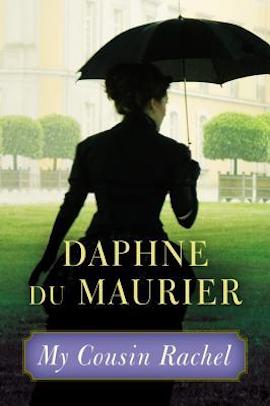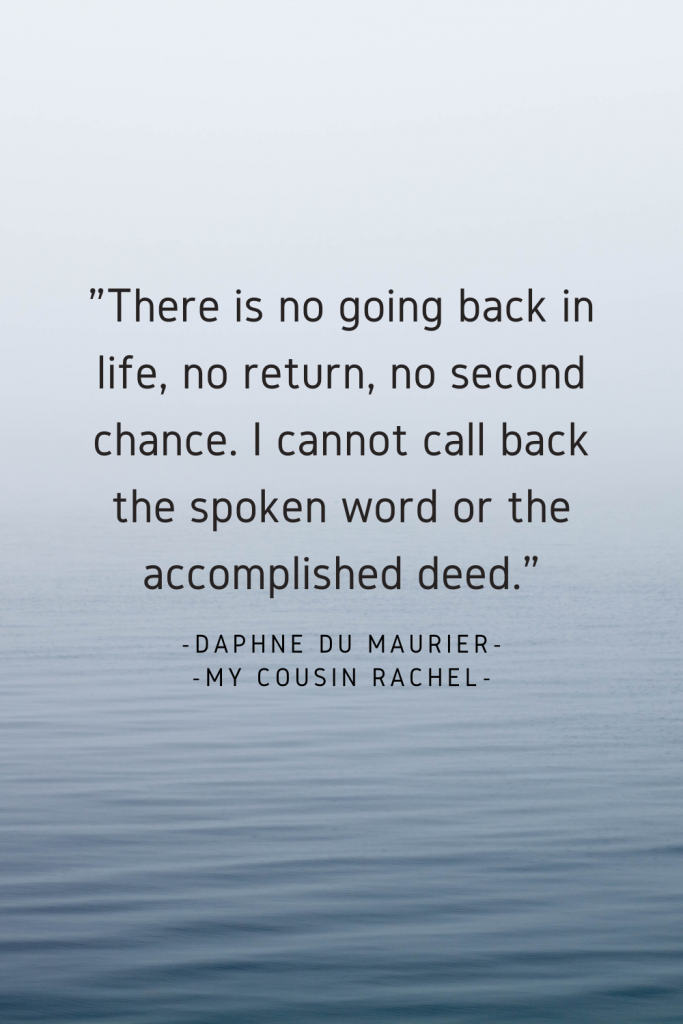Quotes from My Cousin Rachel by Daphne du Maurier
By Nava Atlas | On May 2, 2019 | Updated September 4, 2022 | Comments (0)

My Cousin Rachel is a novel by British author Daphne du Maurier (1907 – 1989), first published in the U.K. in 1951 and in the U.S. in 1952. Echoing du Maurier’s 1938 masterwork Rebecca, My Cousin Rachel is a romantic thriller. Read on for quotes from My Cousin Rachel, which will give you the flavor of this iconic novel.
It’s set primarily on a large estate in Cornwall, England, where du Maurier drew real-life inspiration. She saw a portrait of a woman named Rachel Carew at an estate, and the creative spark was lit.
Multiple television and film adaptations of this novel have been produced. My Cousin Rachel was adapted into a 1983 BBC miniseries, and as a 2011 radio play, also by the BBC. Most recently, a film adaptation was released in 2017 starring the aptly named Rachel Weisz in the title role.
The story is told by Phillip Kendall, a conscience-stricken, unhappy young man. As seen through his eyes, the novel is a mystery to the very end.
Is Rachel Ashley is guilty of the murder of her older English husband in her Florentine villa, and is she equally guilty of an attempt to poison his young cousin and heir in the old family home in Cornwall? Rachel, like du Maurier’s iconic Rebecca character, remains a puzzle to the end. Is Rachel a devil or an angel? It’s up to the reader to decide.
. . . . . . . . . .

Learn more about My Cousin Rachel by Daphne du Maurier
. . . . . . . . . .
“Truth was something intangible, unseen, which sometimes we stumbled upon and did not recognize, but was found, and held, and understood only by old people near their death, or sometimes by the very pure, the very young.”
. . . . . . . . . .
“He was like someone sleeping who woke suddenly and found the world…all the beauty of it, and the sadness too. The hunger and the thirst. Everything he had never thought about or known was there before him, and magnified into one person who by chance, or fate — call it what you will — happened to be me.”
. . . . . . . . . .
“She had contemplated life so long it had become indifferent to her.”
. . . . . . . . . .
“People who mattered could not take the humdrum world. But this was not the world, it was enchantment; and all of it was mine.”
. . . . . . . . . .
“I wondered how it could be that two people who had loved could yet have such a misconception of each other and, with a common grief, grow far apart. There must be something in the nature of love between a man and a woman that drove them to torment and suspicion.”
. . . . . . . . . .
“… A lonely man is an unnatural man, and soon comes to perplexity. From perplexity to fantasy. From fantasy to madness.”
. . . . . . . . .

You may also enjoy: Quotes from Rebecca by Daphne du Maurier
. . . . . . . . . .
“… I believe there is nothing so self-destroying, and no emotion quite so despicable, as jealousy.”
. . . . . . . . . .
“If we killed women for their tongues all men would be murderers.”
. . . . . . . . . .
“A man’s jealousy is like a child’s, fitful and foolish, without depth. A woman’s jealousy is adult, which is very different.”
. . . . . . . . . .
“A woman of feeling does not easily give way. You may call it pride, or tenacity, call it what you will. In spite of all the evidence to the contrary, their emotions are more primitive than ours. They hold to the thing they want, and never surrender.”
. . . . . . . . . .
“We were dreamers, both of us, unpractical, reserved, full of great theories never put to test, and like all dreamers, asleep to the waking world.”
. . . . . . . . . .

. . . . . . . . . .
“There is no going back in life, no return, no second chance. I cannot call back the spoken word or the accomplished deed.”
. . . . . . . . . .
“There are some women … good women very possibly, who through no fault of their own impel disaster. Whatever they touch, somehow turns to tragedy.”
. . . . . . . . . .
“How soft and gentle her name sounds when I whisper it. It lingers on the tongue, insidious and slow, almost like poison, which is apt indeed. It passes from the tongue to the parched lips, and from the lips back to the heart. And the heart controls the body, and the mind also. Shall I be free of it one day?”
. . . . . . . . . .
“I love the stillness of a room after a party. The chairs are moved, the cushions disarranged, everything is there to show that people enjoyed themselves; and one comes back to the empty room happy that it’s over, happy to relax and say, ‘Now we are alone again.’ Ambrose used to say to me in Florence that it was worth the tedium of visitors to experience the pleasure of their going. He was so right.”
. . . . . . . . . .
“The point is, life has to be endured, and lived. But how to live it is the problem.”
Leave a Reply